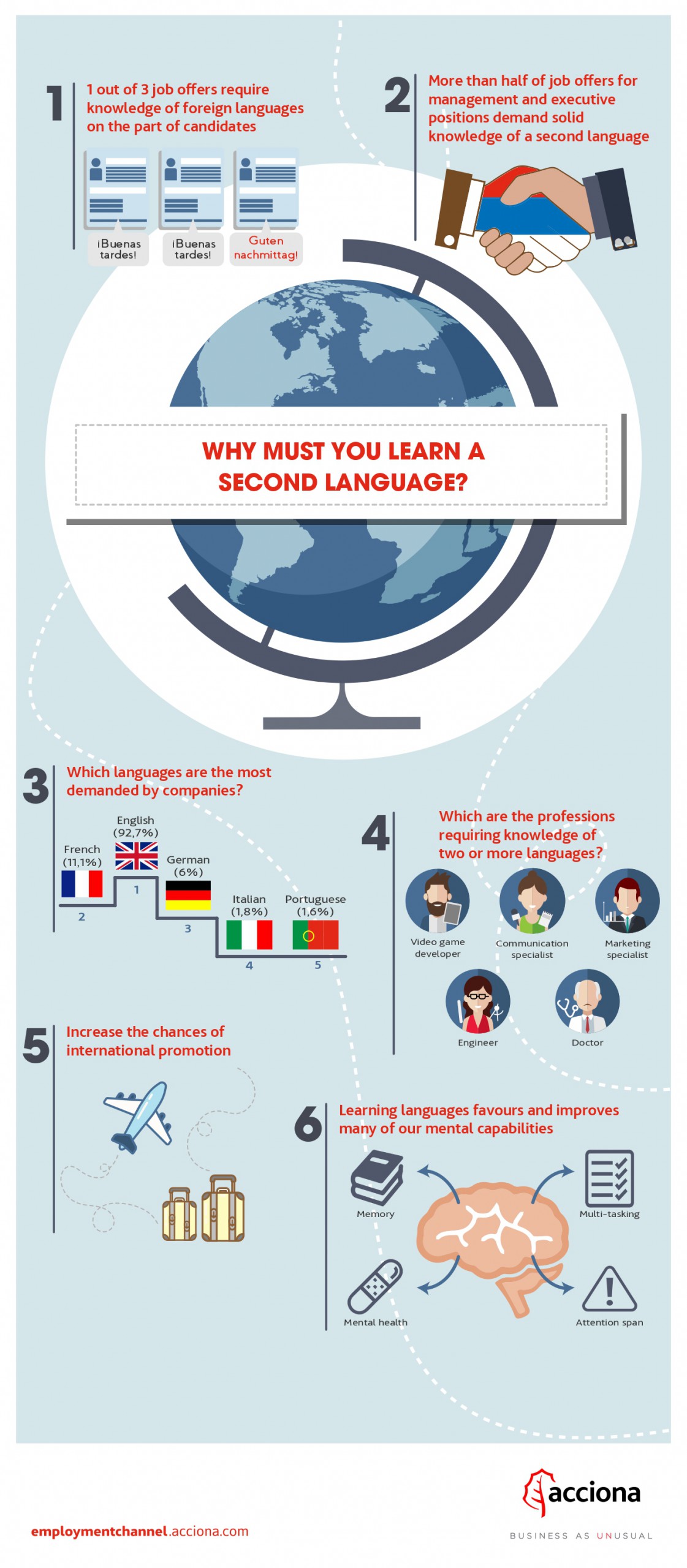Languages are part of every country’s culture. They have their stories in books, movies and cult series. They have a tradition, a journey of thousands of years during which they have refined, new terms emerged and others became obsolete. Learning languages is learning a new lifestyle and, therefore, another way to view the world, including the professional side of it.
A recent analysis determined that being proficient in foreign languages increases the chances of getting a particular job by 37%. But numbers go beyond that: a fourth of current job offers require knowledge of a second language, being English the most demanded, along with French, German, Chinese and Arabic. 80% of middle management and executive positions require a proficient knowledge of a second language. The labour market is getting more and more internationally-oriented, and that requires speaking, thinking and understanding other languages besides native tongue.
Most innovative companies encourage two features strictly related to language: International geographic mobility and in-house continuous training. The latter is based on private teaching (even for groups, thus fostering team work), while the former is a premise as straight as it can be: if you know how to speak other languages, your professional career will thrive towards new horizons.
Learning languages: easier than ever
Working abroad is an extremely valuable asset to have in your curriculum, but also for your personal experience. Travelling is an enriching circumstance in every sense, even if it’s business or work-related. That’s why we want to give you some tips, tricks and places where you’ll be able to practice your second, third or fourth language until you have it under your command.
Trust academies, trust teachers
They’ve already proven their efficiency when it comes to preparing people for official examinations. But the concept of language academy or school has evolved, and nowadays we can find one that suits our needs. Some of them focus on conversational skills, others on more technical job positions, and there are even some with methodologies that, although apparently devised for children (games, songs, etc), are very convenient for adult learning.
Ultimately, academies are full of professionals in education. What does that translate into? Into a programme to follow, with defined objectives, and a group of people with the same desire and interest on learning as you. Besides, both this option and the one below are sometimes promoted by companies themselves, so groups are usually organized within work environments.
Another similar option is to take private lessons. In this case, the study programme is tailored to your professional needs, and to your daily schedule so that your working hours are not overlapped. The truth is that both options, academy and private teaching, are equally valid to learn a new way to communicate.
Learn a new language over a cup of coffee
If you feel like having a chat with native speakers, you must know the language exchange spots in your city. There are surely many coffee bars or pubs in the main cities of your country that provide this service to learn languages, and there are plenty of ways to start a conversation. You can choose to participate in some talking shop, attend a conference or a monologue if you’re not ready yet to loosen up, or you can just start a conversation with somebody.
In the latter case, usually the conversation takes place over a predetermined amount of time in both your language and your partner’s. This is a good way to broaden your social circle and getting fluent in colloquial English, the one you’ll need in your path of international mobility. And who knows, you might even make useful contacts for your professional journey.

Learning on your own
Digitalization has also encouraged self-learning of other languages. Of course, we’re talking about apps and websites that we can carry along in our cell phone so that we can practice during our downtimes, such as while in public transportation, queueing or five minutes before going to bed. Currently, the offer is so wide that every aspect of the language learning process is covered. Vocabulary, conversations in streaming, listening, usage of more technical registers suitable to our working needs… that’s basically learning in a click. And while many of these apps and websites are free, payment resources are not so expensive when compared to the potential they hold inside.
If we have decided to improve a language on our own, it’s also important to watch movies and series in o.v. If it’s possible, and if we have a solid level of understanding, with subtitles in the source language. You will gain confidence, vocabulary and you’ll “train” your ear. Another option, more classic but equally useful for language learning, is to take up reading in the language we want to learn. You can start with simple stories, but you will definitely end up reading entire novel sagas.
What’s best to learn a second language?
The answer is simple: to travel. If we travel to a country whose language is the one we’ve chosen to learn, not only we’ll be compelled to use it 24/7, but we’ll also immerse in the culture, habits, time schedules… an essential requirement to develop our professional career abroad.
There are many reasons to travel: you can do it for leisure, join a course in an academy with native teachers there… All alternatives are valid when it comes to improving our way of communicating in another language. The key to this and everything above is perseverance. We will be able to manage using a second language only if we commit ourselves to dedicate the effort and time required for it. This way, your professional future will become bilingual.
Sources: Forbes, ElPaís, EsMadrid, Diariodelviajero, Vaughan
At ACCIONA our aim is for our workforce to be made up of the best professionals around. We want people who wish to contribute in designing a better planet. Discover our job-offers available worldwide.


